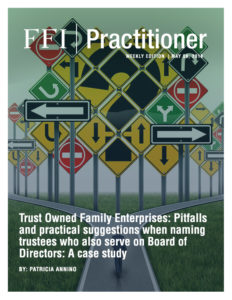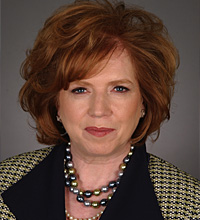
View this edition in our enhanced digital edition format with supporting visual insight and information.
This week, FFI Practitioner examines the complicated situation occurring when the family enterprise is owned in trust and the trustees simultaneously serve on the Board of Directors. Thank you to Patricia Annino for exploring the numerous issues and conflicts that can arise through the following case study.
The case
A narcissist self-made entrepreneur walks into the office of his lawyer to prepare a disaster plan (a/k/a/ estate plan). In the discussion he is totally unable to envision life without himself in it, and because of that myopia, does not understand that the decisions made or risks taken will be quite different when he is no longer around.
After a long discussion, he decides that in the unlikely event he does “hop off the twig” before his time, he will, as part of his disaster plan, establish a trust that names his trusted lawyer, a child working in the business, and a long-standing accountant as trustees. Their mandate will be to keep his empire going and manage it for all his children (and subsequent heirs). It is, of course, interesting to note (and not unusual) that the founder took 35 years to build a significant business and only two hours to decide what the disaster plan should encompass.
Unfortunately, the disaster plan comes to fruition sooner than anyone anticipated. At his death his trust becomes irrevocable and owns the family enterprise. The trustees of the trust, as shareholders, name themselves to the board of directors of the company to replace the patriarch. They believe they are the best people to continue with the operation of the business.
After the dust settles, the trust beneficiaries (all his children – those who work in the business and those who don’t – except the one serving as trustee) become disgruntled. The trustees will not answer their questions. The trustees will not provide them with financial information about the company. When pressed, the trustees respond by telling the beneficiaries that what happens at the corporate level is not the concern of the trust beneficiaries. All beneficiary concerns about the business are rebuffed. Their concerns escalate:
- perhaps because they have heard “through the grapevine” that the board is considering selling their father’s business at a value they believe implausible,
- perhaps because they do not believe their rate of return (what they are receiving from the trust that is attributable to the business enterprise) is “fair” and they are watching the salaries of the board of trustees, board of directors, and their brother who is also employed there (wearing all three hats and being paid for by them),
- perhaps because they believe those who are serving in more than one role are taking a “double” or “triple” dip in compensation,
- perhaps because they believe their brother could never fill their father’s shoes and is running the business into the ground and the board is turning a blind eye,
- perhaps because they believe that they, themselves, could be doing a better job or,
- *perhaps because the trustees are turning a “blind eye” to what the board is doing because that would compromise their compensation.
And, of course, because it is a family and a family enterprise, it is all complicated and entwined. These are complex relationships built over time — among family members, among family members and the patriarch, among family members and the advisers, among the advisers and the patriarch and among all the parties. There is history — good and bad.
It is human nature to acknowledge that everyone looks at the story from his or her own personal point of view, and everyone has a very ingrained memory of what the patriarch said to him or her along the way that frames the point of reference. (“My father loved me more; how could he have not given me a seat at the table?” “You are still a little girl and your father trusted me to make these decisions for you.” “I know best because I was by your father’s side every day while he was building the business.” “I remember what he said when you married Joe — ‘Take care of her’” … and on and on and on.)
The “why” of it is not important; many of those factors may be in play. The reality is that the slow simmer of anger is reaching a boiling point and communication, which was already adversarial, is becoming hostile. The lawyer, accountant, and son who are now serving in multiple capacities are feeling the heat and starting to think that they should pay attention. Yet, because they are so inextricably entwined in the story, they have lost perspective and do not know what to do.
A few questions for the trustees to ponder:
Q. What is my duty? What can I do? What should I consider doing?
A. This is complicated and fact-driven.
What was the patriarch/settlor of the trust’s intent? He must have had a certain level of trust in those he selected, and he should have known that multiple roles would lead to conflicts, and we hope he knew that a key duty of the shareholders (the trustees of the now irrevocable trust) was to appoint the board of directors. He did not exclude them from serving in both positions. Case law in some jurisdictions notes that if the business is majority or fully owned by an estate or by a trust and the members of the board are the same as the trustees, then the duty to report and account is different than if the trust only owns a minority interest in the enterprise. If the trustees and the board members are the same, a full accounting to the trust beneficiaries of what is happening at the business level may be required.
For example, a Nebraska court opinion states that when an entity is owned by a trust, and, more particularly, where a controlling share of that entity is exercised against the best interests of any trust beneficiary, it is a breach of the duty of loyalty.
However, if only a minority interest is owned, most courts have ruled that the fiduciaries cannot be required to render an account of corporate transactions. This principle is one of practical necessity, as they have no right themselves to full information.
Q. Do the trustees have any responsibility to review the business practices that were established by the donor?
A. The answer remains fact-driven.
A paramount question is, again, what was the settlor’s intent? Were the business practices established under the settlor’s control? If so, it is not a final answer, but it matters. The trust documents and the duties they impose on the trustees must be read considering the circumstances known to the settlor at the time the trust is established.
A Wisconsin court has stated that the failure of a family corporation to pay dividends did not amount to a lack of good faith on the part of the trustees when the trustees, acting as directors, believed it was in the best interest of the company and sound business practice not to pay dividends in order to expand the company to keep its competitive position in the industry.
As a Massachusetts court noted, in acting in his corporate role [the trustee] may sometimes have to subordinate the interests of the trust beneficiaries to those of the corporation. The settlor of the trust knew when he created the trusts that the trustees held and would hold those various positions.
Trustees’ corporate duties and actions should be held to a corporate fiduciary standard when a trustee of a trust which holds a minority interest in a corporate entity is also a director of the corporate entity.
So what actions should the trustees consider taking?
- Open communication in the right chain of command is advisable. Corporate board reports to the trustees and the trustees report to the beneficiaries. Transparency to the extent the law allows is important.
- Know what “hat” you are wearing (board member, trustee, employee) and what the duties and responsibilities of the “hat” are. Know that if you are wearing more than one hat, you likely have conflicting duties and loyalties.
- Read and review all trust documents and all corporate documents and make sure you understand them. If you are in the planning stage (before patriarch dies) have a coordinated estate/fiduciary and business plan. If planning is after death (as much planning happens after death now though it should happen before death) make sure the “right hand knows what the left hand is doing.” Be sure that you have advisers on both corporate and fiduciary sides, that they know each other, and that all are working together as a team.
- Provide an appropriate forum to address beneficiary issues (the psychology of ownership). Human nature tells us that if you can’t matter in a positive way, you will matter in a negative way because what is most important is to matter. Human nature also tells us that most people strive for recognition. Having voices heard and questions answered are critical to the ongoing dynamic.
- Contemplate having a co-independent trustee appointed who is not involved with the business and can focus on the beneficiary issues – spending needs, mental illness, substance abuse. When someone is wearing more than one hat, the normal inclination is to focus on the business hat and neglect the other hats.
- Consider an independent directors committee. Find a voice for independent thinking and guidance.
- Consider declining or resigning from one or more of the roles. It may be tough to grapple with that. However, when looking at the situation objectively, it is wise to self-evaluate and determine whether this is the right role for you at this time in your life. If not, give yourself permission (no matter what you promised the patriarch) to step aside.
About the contributor
 Patricia M. Annino is an attorney with Rimôn, P.C. in Boston. A member of the FFI board of directors and a frequent contributor to FFI Practitioner, she has been voted by her peers as one of the Best Lawyers in America, Estate Planner of the Year and EuroMoney’s “Best in Wealth Management — USA.”
Patricia M. Annino is an attorney with Rimôn, P.C. in Boston. A member of the FFI board of directors and a frequent contributor to FFI Practitioner, she has been voted by her peers as one of the Best Lawyers in America, Estate Planner of the Year and EuroMoney’s “Best in Wealth Management — USA.”
About Rimôn, P.C.
Rimôn, P.C. is a global law firm serving the needs of individuals and family businesses.

View this edition in our enhanced digital edition format with supporting visual insight and information.





